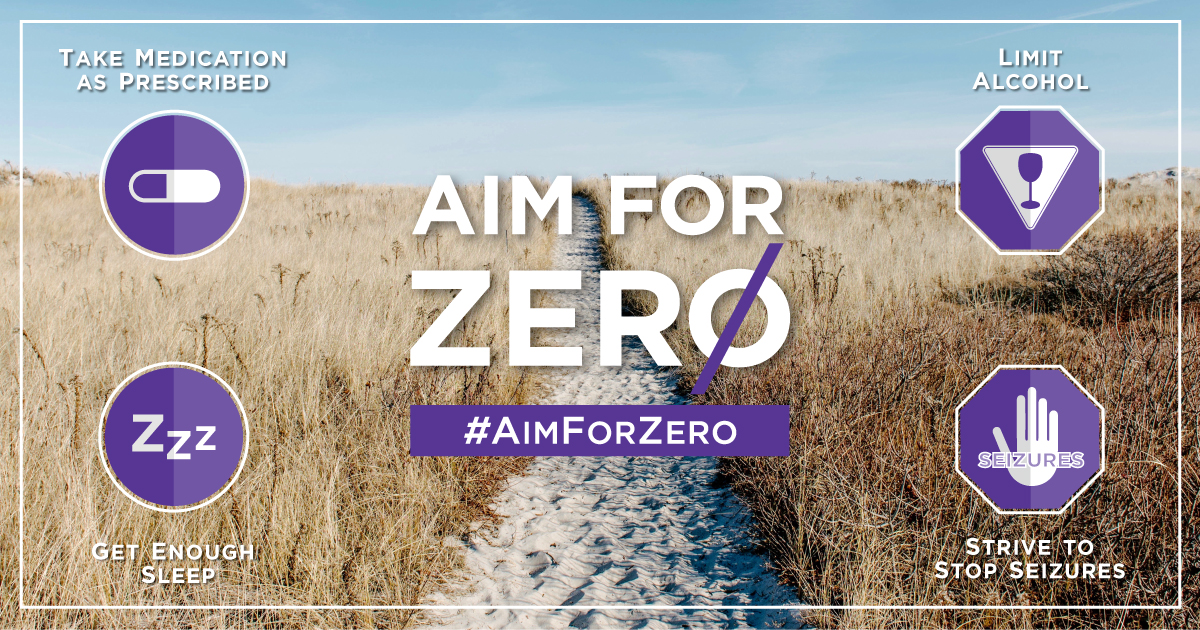#AimForZero: Striving Toward a Future Free from Sudden Unexpected Death in Epilepsy

The 3.4 million people in the United States living with epilepsy need to know about the potential deadly impact of a single seizure and how they can strive to #AimForZero seizures to reduce their risk of Sudden Unexpected Death in Epilepsy (SUDEP).
The Importance of Understanding SUDEP Risk
Every year, 1 in 150 people who have uncontrolled seizures dies from SUDEP.1 Accordingly, experts regard SUDEP as the leading epilepsy-related cause of death2; however, in a 2016 survey of more than 1,000 people with epilepsy and caregivers of people with epilepsy, only 18% of respondents reported having discussed the risk of SUDEP with their doctor.
When people with epilepsy and their caregivers are empowered with information to understand SUDEP, they can take action to reduce risk of harm. To respond to this urgency, raise awareness, and promote steps that can help prevent SUDEP, the Epilepsy Foundation’s SUDEP Institute issued this Epilepsy.com Special Report and launched a dedicated #AimForZero hashtag to facilitate greater discussion of SUDEP.
Fight Seizures and SUDEP
#AimForZero encourages people with epilepsy to get started with reducing their risk of SUDEP with these critical actions. Visit each page to learn why these behaviors are important and what to do.
- Take medication as prescribed
- Get enough sleep
- Limit alcohol and illicit substances
- Strive to stop seizures
Don't Stop Here
Talk with your health care team now about your risks for seizures and SUDEP. Work together to create a seizure management and lifestyle plan that's right for you.
Putting these behaviors into action can be challenging for people with epilepsy — and their efforts must be supported by caregivers and healthcare team members.
Webinar Recorded on November 14
Watch the "Talking About SUDEP Webinar" recorded on November 14, 2017
Learn More and Share These Videos
Orrin Devinsky MD Talks About SUDEP, talkaboutit.org
Dr. Jeff Buchhalter on the Ketogenic Diet and SUDEP
Provided by our partner, The Charlie Foundation for Ketogenic Therapies
Expert Insight

Why is communicating about SUDEP critically important?
"Epilepsy-related mortality should be a public health priority. There are at least 2,750 U.S. cases of SUDEP every year. In comparison, in 2013, sudden infant death syndrome (SIDS) caused 1,575 deaths, and accidental exposure to smoke, fire, and flames caused 2,760 deaths."
— Orrin Devinsky, MD, Director of the New York University Langone Comprehensive Epilepsy Center
SUDEP Guideline for Professionals
In 2017, the American Academy of Neurology and the American Epilepsy Society released a new SUDEP Guideline. This guideline is a culmination of a multi-year effort to synthesize the evidence on SUDEP risk and provide recommendations on how neurologists can best communicate risks to patients and families.
Families Speak Out

"John Paul had his whole life ahead of him, full of promise, to explore and learn about the world around him and make a positive difference in the lives of others.
For those reading this, if your child, loved one, or someone you know has had seizures, I urge you to be proactive and learn what you can about SUDEP. Make the inquiry with your doctor; take the time to learn about this silent killer that so few doctors will initiate discussion about. In doing so, you may save a life. Our son would have wanted that."
— John Popovich, who lost his 19-year-old son John Paul to SUDEP
References
1. Tomson T, Nashef L, Ryvlin P. Sudden unexpected death in epilepsy: current knowledge and future directions. Lancet Neurol. 2008;7(11):1021-31.↩
2. Miller WR, Young N. Discussing Sudden Unexpected Death in Epilepsy (SUDEP) with Patients: Practices of Health-Care Providers. Epilepsy Behav. 2014 Mar: 32: 38-41. Available online at http://www.ncbi.nlm.nih.gov/pmc/articles/PMC3985269/. Last accessed May 26, 2016.↩
Resources
Epilepsy Centers
Epilepsy centers provide you with a team of specialists to help you diagnose your epilepsy and explore treatment options.
Epilepsy Medication
Find in-depth information on anti-seizure medications so you know what to ask your doctor.
Epilepsy and Seizures 24/7 Helpline
Call our Epilepsy and Seizures 24/7 Helpline and talk with an epilepsy information specialist or submit a question online.
Tools & Resources
Get information, tips, and more to help you manage your epilepsy.



